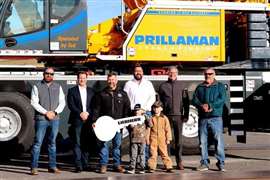Safety on site: the role of the quick coupler
22 February 2023
It is one of the most compelling arguments in demolition.
The idea of not just changing the work tool on an excavator in a matter of seconds, but staying in the cab the whole time.
 Steelwrist: ‘A work tool needs an excavator, not the other way round.’ (Photo: Steelwrist)
Steelwrist: ‘A work tool needs an excavator, not the other way round.’ (Photo: Steelwrist)
It is a major contribution to safety on the jobsite.
But how did it reach this point? And where does it go from here? What else is the quick coupler capable of?
Karl Serneberg, vice president of OEM sales and marketing at Swedish manufacturer Steelwrist, talks about his company’s experience.
D&Ri: What are the main areas in which quick couplers and other attachments can help increase safety on site?
Karl: A job needs a work tool, and a work tool needs an excavator - not the other way around. That’s the starting point when we think about how to increase your excavator efficiency.
Let’s focus on quick couplers. What is first and foremost crucial with a quick coupler is that you can change the work tool in a safe manner. With the demand for productivity constantly rising and in many applications the need for quick change of work tool is almost continuous means the importance of quick couplers is just increasing.
All Steelwrist quick couplers are based on the S-Type (symmetrical) standard which is by far the fastest growing standard with increasing penetration across the whole world. There are many reasons for this, but the compact design, light weight and robustness of the S-type couplers are among them, as is the fact that the quick coupler is based on an open standard.
How does this compare to a few years ago? Where have the improvements come about?
During the past few years we have seen that the requirement to be able to change hydraulic powered work tools without leaving the cab is increasing. This is why the demand for fully automatic quick couplers is increasing fast. With Steelwrist SQ technology you can change between hydraulic powered work tools such as breaker, crusher, shear, grapple as well as mechanical work tools in only seconds – all without leaving the cabin.
What is driving change in the manufacturing process? Manufacturing innovations? Customer requirements? Legislation? Economics?
I would say that there are two sides to this.
First of all, customers are increasingly demanding safer coupling solutions and the demand is coming from all over the world. Then in parallel to this, legislators are raising the bar for what is considered “safe”.
When we launched the Front Pin Lock technology in 2012, we wanted operators and ground personnel to feel safe during work tool changes, as the operator could see when the work tool is in a safe position.
Thanks to that Steelwrist couplers are not sensor dependent and our solutions works equally well with all types of excavators regardless of whether they are small, large, new or used. Today, with thousands of couplers in the field, the result has been a higher safety level and a robust solution cast in steel.
Secondly customers want to increase the efficiency and versatility of their investment, and this drives the continuously increased demand for tiltrotators.
The core of the Steelwrist product offering includes quick couplers, tilt couplers and tiltrotators that together with the control system make up the foundation for higher excavator efficiency. This then drives development of new work tools (powered work tools and non-powered work tools) that makes the excavator become a true tool carrier.
What are the biggest markets for your products?
Tiltrotators for all types of application between 2 and 33 t are a big market.
First movers are often wheeled excavators and owner operators, especially contractors that work on a fixed price per job. Making the Excavator 25-30% more efficient means the same work can be done in significantly less time and the profit ends up in in the pocket of the contractor.
SQ fully automatic quick couplers are also popular.
Demolition and general construction are driving the increase in demand. Especially when you see the vast range of powered work tools involved in demolition applications it is easy to understand how beneficial the fully automatic quick coupler is in these types of jobs.
What further changes or trends do you see developing in the future?
The penetration of tiltrotators will only continue to increase globally, this in combination with the growing demand for fully automatic quick couplers are the two most significant trends we see. This is as both these solutions are fundamental to drive excavator efficiency.
The above in combination with expansion of MCS (Machine Control Systems) which allows for increased automation together with the tiltrotator.
How is the Open-S Alliance contributing to wider product development in the industry?
Let’s compare with the recent legislation implemented by EU connected to the USB-C standard. The goal here is to give the consumer the freedom to buy solutions with different brands all sharing the same interphase to the charger.
The legislation also says that the charger should be optional to buy when you by a new device with the USB-C port.
Why? Well, if you already have the chargers you need, it is not mandatory to add another one.
With the Open-S alliance we strive to give machine operators and contractors around the world the freedom to combine quick couplers, tiltrotators and work tools from different manufacturers that are following the standard.
With a common standard it is easier for industry manufacturers to continue competing with performance and functionality, and still offer customers compatibility. The standard also means that dealers can provide clearer information about which products fit together.
The Steelwrist fully automatic SQ quick coupler is designed to be able to connect to other brands following the Open-S standard.
To conclude, the Open-S alliance is a good for both the machine owner and the industry.
- You can read more about quick couplers and other attachments in the January-March 2023 issue of Demolition & Recycling International


